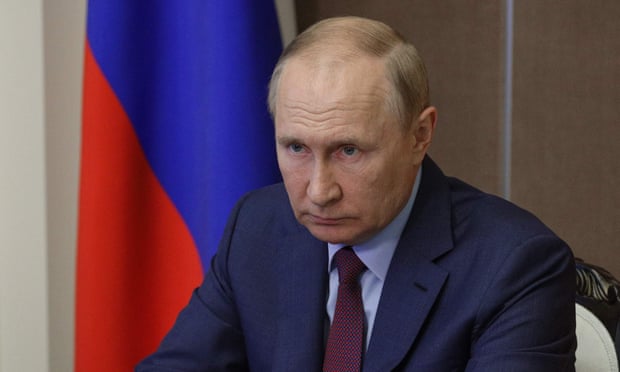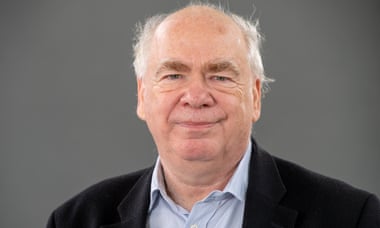Peter Beaumont

Russia’s war against Ukraine has been hampered by failings experienced by autocratic states during conflict, according to a far-reaching new study of command in war by one of the UK’s most prominent academics in the field.
Command, a wide-ranging analysis of post-second world war conflicts by the leading strategic studies expert Lawrence Freedman, examines a series of well-known conflicts, from the Cuban missile crisis to the French defeat at the hands of the Viet Minh at Dien Bien Phu, through to the Falklands war and Saddam Hussein’s invasion of Kuwait, up to the present war in Ukraine.
“The big theme,” said Freedman, emeritus professor of war studies at King’s College London, “is that autocracies are very bad at this. A lot of most catastrophic decisions come from autocratic decision-making. That is certainly the case with Vladimir Putin but also Saddam Hussein and even [the Argentine military dictator Leopoldo] Galtieri during the Falklands war.”
But he adds: “It’s not that democracies always make better decisions.”
As Freedman’s book sets out to show, in key interactions between military and political leaders – which even in the best circumstances can be characterised by tensions and personal conflicts – it is the lack of open and often critical feedback that leads to bad decision-making.
“Autocracies don’t have the feedback mechanism, and dig themselves in by believing that the advantage of autocracy is bold and decisive decision-making.
“While in certain circumstances you can tolerate quite a lot of bad decision-making and come out all right, because you have superior numbers, where it is very tight, one poor decision or bit of bad luck can put you out completely.”
And while Russian military operations for more than a century have often relied on using overwhelming numbers (often with little consideration for losses), in Ukraine, Russia appears to have been constrained by domestic political considerations from introducing a general mobilisation, which has limited the scale of forces it can deploy.
 Lawrence Freedman, emeritus professor of war studies at King’s College London, has written a new study about command in military conflicts. Photograph: Roberto Ricciuti/Getty Images
Lawrence Freedman, emeritus professor of war studies at King’s College London, has written a new study about command in military conflicts. Photograph: Roberto Ricciuti/Getty ImagesOne issue that has intrigued Freedman, as well as other analysts, is why Putin – whose use of force had been limited in scope before Ukraine – embarked on such a dangerous and badly prepared-for gamble in Ukraine.
“Military force had been quite good for Putin up until now. He used it effectively in Chechnya, Crimea, Georgia and Syria. He used it in quite a limited fashion in Ukraine’s Donbas region in 2014 where those doing his dirty work wanted him to take an even more aggressive approach.
“But his approach to the current Ukraine conflict has clearly been deluded. You have to assume he didn’t realise the gamble he was taking. He genuinely thought Ukraine would crumble quite quickly, and it’s hard to know why. “Even those [foreign] analysts who thought Ukraine’s military might not do well didn’t believe that the Ukrainian people would succumb. But he did.
He did see it as a special military operation [ the term the Kremlin has consistently used rather than “war”] that would last a few days. And once that plan had failed, they were on the back foot.”
A key failure, in Freedman’s view, was that while Russian intelligence had widely infiltrated Ukraine – as even Kyiv has acknowledged – the key figures around Putin either did not understand Ukraine or acted as an echo chamber for him.
“Experts on Ukraine in Russia don’t seem to have been consulted. It looks like Putin was talking to his mates in the FSB [the federal security service] and GRU [military intelligence ] who shared his prejudices. And the ranting speech he gave on 21 February [three days before Russia invaded] is still as good a guide as anything to believe what he thinks. It is clear from that that he finds it very hard to take Ukraine and its president, Volodymyr Zelenskiy, seriously. I think he thought Zelenskiy would make a deal. He didn’t.”
At the heart of the problem, Freedman believes, is the rigidly hierarchical nature of the Kremlin’s decision-making and how those at the very top are immune to responsibility for mistakes.
“There are no incentives to tell the truth on the ground to the higher command. The senior military – people such as defence minister Sergei Shoigu and chief of the general staff Valery Gerasimov – are all part of the inner circle. They’ve sacked lots of generals now they know that there’s a problem. But it’s not them that’s the problem. It’s always someone else.”
Privacy Notice: Newsletters may contain info about charities, online ads, and content funded by outside parties. For more information see our Privacy Policy. We use Google reCaptcha to protect our website and the Google Privacy Policy and Terms of Service apply.
And since Russia’s first plan to topple Ukraine with a coup de main against Kyiv collapsed within the first few weeks amid fierce Ukrainian resistance and Russian logistical incompetence, Moscow has struggled to find a credible plan B.
“They tried for plan B – the famous convoy that gathered outside Kyiv – but they couldn’t find one. It was logistically beyond them. The lines were too exposed. So they reverted back to concentrating on the Donbas.
“Even then it took until May to focus on what they could do – artillery barrages on a narrow front, a tactic for which Ukraine had no easy response, except to take heavy casualties until western weapons systems began arriving.”
Even now, six months into the war, Freedman struggles to understand the logic of the Kremlin, not least its tactic of creating a wintertime energy crisis in Europe to undermine support for Kyiv.
There are no incentives to tell the truth on the ground to the higher command. They are all part of the inner circleLawrence Freedman
“I think the only ‘theory of victory’ the Kremlin has at the present is that the west turns on Ukraine because of the energy crisis. But the surprise there is that Moscow has not asked for a ceasefire now. That would put Zelenskiy on the spot because he couldn’t agree to one.
“Instead, Putin is still acting as though he expects more from this war than he has already got. Why I think there are some signs of desperation on the Russian side is that some are beginning to recognise that an energy crunch is not going to lead to a betrayal of Ukraine. In the long term, that signals the risk of deep damage to Russia’s economy.”
While Freedman is cautious about predicting that Russian forces could face a second big setback – not least in the south of Ukraine, where Kyiv has been effectively pressing on Kherson – he sees the same lack of institutional imagination defining the future trajectory of the war.
“Is there going to be something big like Russian forces getting encircled and trapped [around Kherson]? Unless the system gets a shock like the one experienced in late February and early March [when Russia abandoned its effort to take Kyiv], I think Russia will doggedly carry on, if for no other reason than that it can’t think of anything better to do. The Kremlin is paralysed.”
I write from Ukraine, where I've spent much of the past six months, reporting on the build-up to the conflict and the grim reality of war. It has been the most intense time of my 30-year career. In December I visited the trenches outside Donetsk with the Ukrainian army; in January I went to Mariupol and drove along the coast to Crimea; on 24 February I was with other colleagues in the Ukrainian capital as the first Russian bombs fell.
This is the biggest war in Europe since 1945. It is, for Ukrainians, an existential struggle against a new but familiar Russian imperialism. Our team of reporters and editors intend to cover this war for as long as it lasts, however expensive that may prove to be. We are committed to telling the human stories of those caught up in war, as well as the international dimension. But we can't do this without the support of Guardian readers. It is your passion, engagement and financial contributions which underpin our independent journalism and make it possible for us to report from places like Ukraine.
If you are able to help with a monthly or single contribution it will boost our resources and enhance our ability to report the truth about what is happening in this terrible conflict.
Thank you.
No comments:
Post a Comment